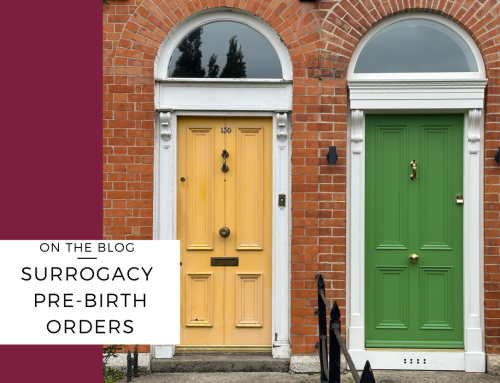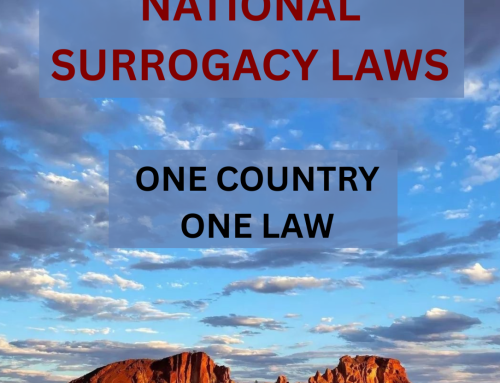Feminism and surrogacy.
A core belief of any feminist, is that a woman has the right to full bodily autonomy. That includes reproductive autonomy; the right to determine if and when she has children, how many, and the right to make decisions about her fertility and reproduction. I am a surrogate and a feminist; I aim to be intersectional in my feminism. My feminism crystallised when I became a mother to two boy children, and I later worked at an aboriginal organisation. I was confronted with my privilege as a white person, and the disadvantage I experience as a woman, and reflected on the different experiences my two white sons were likely to have in their lifetimes.
I exercised my bodily autonomy to assist people with the donation of my eggs, and as a surrogate. The decision was discussed with my partner – not because he could tell me what to do, but because we are a team and it was a team decision. I liken the decision of becoming an egg donor to that of breastfeeding our children – my body, my choice. The idea that anyone could tell me what I could do with my body, or my genes for that matter, is offensive to me.
As a privileged woman with good fertility and health, I wanted to help to ‘level the playing field’ for someone without my privilege. This might have influenced my decision to carry for a gay couple in the middle of the marriage equality debate in Australia. Certainly, I have felt very lucky to have been able to make reproductive decisions without many barriers, unlike many gay men, and women suffering infertility.
But as it turns out, some people who claim to be feminists, are highly critical of all forms of surrogacy. I have considered their arguments and reflected on my own experience as a surrogate, and as a surrogacy lawyer. While I don’t agree with much of the criticism, I have reflected on how I can help promote best practice surrogacy in Australia, and educate people to make empowered, ethical decisions about international surrogacy.
The criticisms of surrogacy might be summarised as follows:
- That surrogacy is akin to child trafficking, or ‘baby selling.’
Surrogates are not paid in Australia, and any money received is to cover their expenses. They are not paid in exchange for the child or to adhere to contractual obligations. Surrogacy arrangements in Australia require that the surrogate retains her bodily autonomy, and that the agreement is unenforceable. Above all else, the child’s rights are paramount. If a surrogacy arrangement goes wrong, the child’s rights will be considered paramount when determining who should be responsible for them and where they should live. It is not possible to have a contract on a child in Australia. And while not perfect, the counselling and legal processes of Australian surrogacy require the parties to consider the rights and interests of any child born through the arrangement.
. - That surrogacy is exploitative and deny a woman her right to bodily autonomy.
Some critics liken surrogacy to sex work, in that they claim that it involves the commodification of a woman’s body for someone else’s purposes. Critics claim that surrogacy is sexual and reproductive servitude for women. In some international surrogacy cases, this criticism might be valid – and particularly in circumstances where surrogates live in poverty and are contracted precisely because of their socio-economic situation. Some of the contracts in those arrangements are offensive – including clauses that suggest that she won’t get paid if she miscarries. Control of the surrogate’s body and autonomy includes clauses that restrict her movements and require her to adhere to strict living conditions. To be fair, those scenarios are less likely in developed countries such as the US and Canada.
.
In Australia, the surrogate maintains her bodily autonomy. There might be agreements between the parties about the surrogate’s conduct and lifestyle, such as that she will not drink alcohol during pregnancy, but it is not enforceable. I emphasise to clients entering into surrogacy arrangements in Australia, is that the surrogate can ultimately determine the care she receives during pregnancy, and she can consent or withhold consent to any treatment, including termination of the pregnancy.
.
Women have a right to determine what they do with their bodies, and this includes surrogacy and sex work. Feminists should be happy for empowered women making empowered choices that are right for them. If we are worried about the exploitation of women (as surrogates or sex workers) then we should regulate the industries and support everyone to make informed and empowered choices for themselves. Stigmatising, or criminalising sex work or surrogacy, does not safeguard women’s rights. What’s more – we should be listening to surrogates, or sex workers, to support them in exercising their autonomy. We don’t need other people speaking for us.
. - There is no right to a child; people who are unable to conceive or carry a child themselves must reconcile themselves to being child-free.
I agree with the critics in part on this issue – there is no right to a child. We are socialised to believe that when we grow up, we should find a partner, settle down and have children. There are plenty of ways to live happy and fulfilled lives without children. Everyone should be free to choose whether having children is the right decision for them – that means changing how we view women who are child-free, and not pressuring people to have children.
.
While I don’t believe anyone is entitled to a child, I still carried a baby for a couple who wanted one. I maintain that I have the right to bodily autonomy and reproductive autonomy, and the rights of the child were maintained as paramount. The baby I birthed is well-looked after, loved and cared for, and we as a society have generally accepted that children can be raised by two dads without any detriment to their well-being. My main focus, and that of her parents, is always for her well-being and her sense of self. She will always have a relationship with me, and my children, and I will support her interests by being available to her when and if she needs.
. - The erasure of the mother.
This criticism suggests that only the birthing woman can fill the role of mother. Research shows there to be primal connections between a woman and the baby she carried – and as someone who gave a baby to another couple, I can attest to this being true. I felt a connection with the baby I carried, and maybe that’s because we share genetics and she looks like me and my family members. I can, however, also confirm that carrying and birthing her did not may me want to be with her or to parent her. She was conceived with the intention of her being raised by her dads, and I felt 100% happy and satisfied doing this.
.
I’ve heard some criticism that giving away a baby somehow undermines motherhood, and the role of mothers. I think this is reductive, and buys into the Hallmark card version of motherhood. It also presumes that only mothers are capable of caring for children. I’ve written more about this and challenges the idea that women are made to be mothers or that children only thrive with their mothers.
.
Some critics suggest that the Birth Certificate does not include the birth mother’s details and that this ‘erases’ her from the child’s history. This is another criticism that I’m willing to accept, at least in part. Current process in Australia is that the original Birth Certificate lists the surrogate and her partner as the birth parents. Once the Parentage Order is made, a new Birth Certificate is issued with the intended parents listed as parents. Most surrogates feel uncomfortable being on the Birth Certificate, even for a short while, for a child they do not consider is their child. But then, is there any reason why a Birth Certificate cannot list more than just the parents? Would it not be in the child’s best interests to have their birth parents, any donors, and the intended parents listed on their Birth Certificate? The removal of the surrogate can feel erasing – of the true history of the birth, genetics, and of the surrogate herself. Why does a Birth Certificate list two dads, as if there was no woman involved in the conception, pregnancy and birth? If the critics believe it is erasure, can we not find a better way to recognise the surrogate and acknowledge the intended parents? John Pascoe (former Chief Judge of the Family Court) elaborated on this idea in the 2016 Louis Waller Lecture on the rights of the child to know their history. There are options for integrated birth certificates in some jurisdictions.
.
Cancelling the critics
We may never reconcile the criticisms of surrogacy with the reasons why we do it. I recognise that those critics will never convince me that all surrogacy is evil, and I will never convince them of how amazing it can be. My version of feminism seeks to empower women to make empowered decisions, and anyone that seeks to deny this right is not a feminist in my book.
Some critics of surrogacy rely on anecdotal evidence of a few women who had poor surrogacy experiences. It would be fantasy to assume that all surrogacy is good and all outcomes are positive. It is disappointing that a few stories should serve to promote the abolition of surrogacy altogether, or to bolster the opinions of those who claim we are all being exploited. I am not looking at surrogacy through rose-coloured glasses; I know that most surrogacy is imperfect, and that we can all do more to make it better.
The rights of the child should always be paramount, and surrogates must maintain bodily autonomy if we are to protect the integrity of surrogacy arrangements. Ultimately, it is the right of every woman to determine whether she carries a baby for someone else, and we should provide an appropriate framework to ensure her rights are protected. Abolishing surrogacy is not the answer; regulation is the key.
I presented at the Melbourne University Law School’s Health Law and Ethics Seminar in 2019 and again in 2020, and you can read my speech: Surrogacy as Motherhood: The Inalienable Right to Choose, which elaborates on these themes. You can also read my thoughts on best practice surrogacy and how we can make sure we promote the interests and rights of surrogates and children.
If you are new to surrogacy, you can find our more about the process by reading the Surrogacy Blog, downloading the free Surrogacy Handbook, and listening to the Surrogacy Podcast.
I’ve written a book, More Than Just a Baby: A Guide to Surrogacy for Intended Parents and Surrogates, which you can purchase in paperback and electronic versions.








